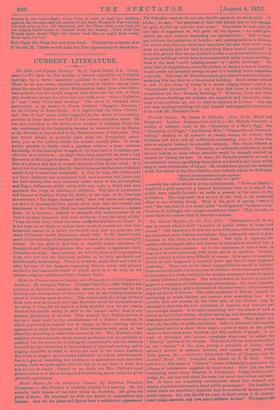CURRENT LITERATURE.
The Bible and Popular Theology. By G. Vance Smith, B.A. (Long- mans.)—We have in this volume a learned exposition of Unitarian theology, by a writer eminently qualified to speak for Unitarians. There is, we are aware, considerable variety of opinion among them about the special doctrine which distinguishes them from other Chris- tian societies, but we should suppose that there are but few of them who would not accept the views here pat forth as to "what a Unitarian is" and "what Unitarians worship." The work is intended more particularly as an answer to Canon Liddon's "Bampton Lectures " on the Divinity of Jesus Christ. It is argued that the titles "Christ" and "Son of God" never really suggested to the minds of the contem- poraries of Jesus that be was God in the current orthodox sense. He was not, according to Mr. Smith, even accused of claiming Deity, but was condemned by the Sanhedrin because he claimed to be the Christ, or the Messiah, or Son of God in the Messianic sense of that term. This the writer thinks is perfectly plain from the Evangelical narra- tives, just as Dr. Liddon thinks the reverse equally plain. It seems hardly possible to decide such a question without a more accurate knowledge of the theological thought of the time than it is perhaps pos- sible for us to arrive at. As might have been expected, we have a long discussion of the Logos doctrine. The idea of the Logos varied between that of a person and that of a more attribute of the Divine mind. It is out of the first conception that Mr. Smith believes the doctrine of Christ's actual deity to have been developed. A Jew, he says, like Philo could not have distinctly and consciously held such a-notion, but Justin and the later fathers, who were educated under more or less philosophical and Pagan influences, might easily drift into such a belief, and even approach the verge of ditheism or tritheisna. The idea of incarnation had become so familiar, thinks Mr. Smith, in the time of St. John that the sentence, "The Logos became flash," need not excite our surprise, nor must it necessarily have meant more than that the revealer and instrument of the Divine Mind was manifested among men in a human form. It is, however, difficult to reconcile this interpretation of St. John's opening sentences with such words as " I am the bread of life," "I am the true vine," which the same evairgelist attributes to Jesus. It is not easy, as we think, to explain these words in accordance with Uni- tarianism, except in a rather tar-fetched way, and we presume that many Unitarians would themselves admit this. In Mr. Smith's treat- ment of the authority of Scripture thorn is much in which we thoroughly concur. Wo are glad to find that ho candidly makes allowance for thoughtful and intelligent persons who are unable to appreciate fairly Unitarian theology. Such persons, we believe, there will long continuo to be, who will feel the Unitarian position to be both spiritually and intellectually unsatisfying. There is, however, much force and truth in what he says of the dangers connecting Church union with priestly authority, the lamentable result of which error is to be seen in the present religious condition of Italy, France, Spain.


































 Previous page
Previous page